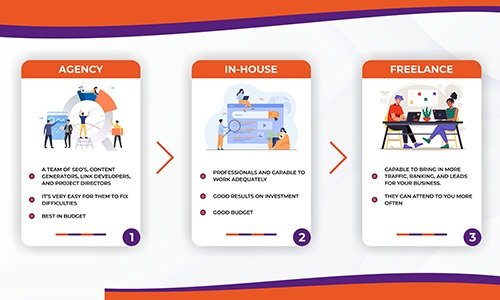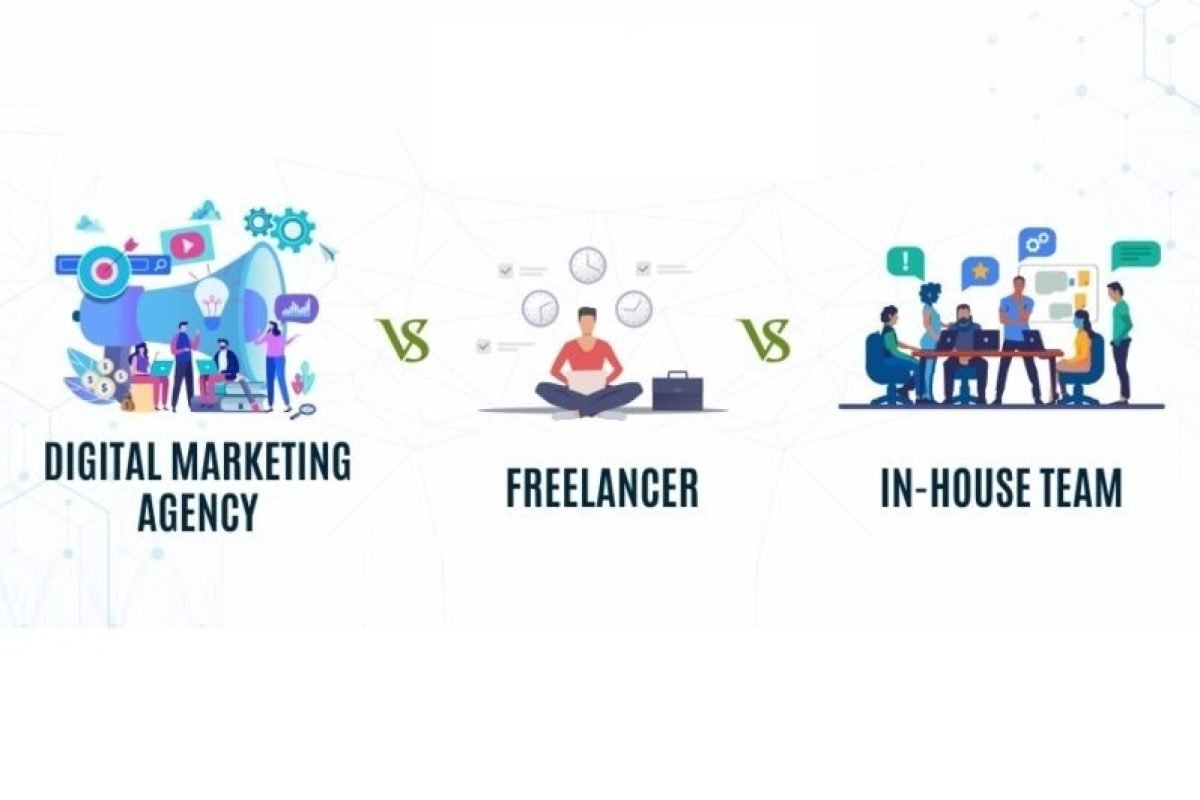In the ever-evolving digital landscape, having a strong online presence is crucial for businesses of all sizes. Whether you’re a startup, a growing enterprise, or an established brand, the question of how to handle your website needs often arises. Should you hire a freelancer, collaborate with an agency, or build an in-house team? Each option comes with its own set of benefits and considerations. Let’s dive into the pros and cons to help you make an informed decision.
Freelancers: The Flexible Powerhouses
Benefits:
- Cost-Effective:
- Freelancers often have lower overhead costs, allowing them to offer competitive rates compared to agencies or in-house teams.
- You pay for the specific services you need, making it a cost-effective solution for small to medium-sized projects.
- Flexibility:
- Freelancers are adaptable and can quickly adjust to the changing needs of your project.
- Perfect for short-term or one-off tasks where flexibility is key.
- Specialized Expertise:
- Freelancers often specialize in niche areas, providing you access to experts for specific tasks.
- If you need a particular skill set, hiring a freelancer with that expertise is a targeted solution.
Examples:
- Graphic Design: Need a stunning logo or eye-catching visuals for your website? Hiring a freelance graphic designer can bring your brand to life.
- Content Writing: Freelance writers excel in creating engaging and SEO-friendly content. Whether it’s blog posts, product descriptions, or website copy, they can cater to your content needs.
- Web Development: If you require a specific feature or functionality for your website, hiring a freelance web developer for a short-term project can be a cost-effective solution.
Read Also: How to Measure the ROI of Your SEO Efforts

Agencies: The All-in-One Solution
Benefits:
- Comprehensive Services:
- Agencies typically have a team of experts, offering a wide range of services from design and development to marketing and maintenance.
- A one-stop-shop for all your website needs, ensuring consistency across different aspects of your online presence.
- Scale and Resources:
- Agencies have the resources to handle large-scale projects and tight deadlines.
- Access to a diverse team with varied skills ensures that your project gets the attention it deserves.
- Professionalism and Accountability:
- Established agencies often have a track record of successful projects, providing a level of professionalism and accountability.
- Contracts and agreements help set clear expectations, and agencies are motivated to maintain their reputation.
Examples:
- E-commerce Development: If you’re launching an online store, an agency can handle the entire process, from designing the website to implementing secure payment gateways.
- Digital Marketing Campaigns: Agencies excel in creating and executing comprehensive digital marketing strategies, ensuring your website gets the visibility it deserves.
- Custom Software Solutions: For complex web applications or specialized software, agencies with experienced developers can provide tailored solutions.
Read Also: Navigating Tomorrow: The Future of SEO in 2024 and Beyond
In-House Teams: The Dedicated Collaborators
Benefits:
- Deep Understanding of the Brand:
- In-house teams are fully immersed in your brand, understanding its nuances and values.
- This deep understanding can lead to more cohesive and aligned design and development work.
- Immediate Communication:
- Being in the same physical location allows for immediate communication and collaboration.
- Quick decision-making and seamless coordination are hallmarks of in-house teams.
- Long-Term Vision:
- In-house teams are invested in the long-term success of the company.
- They can work on continuous improvements, ensuring that your website evolves with your business.
Examples:
- Branding Overhaul: If you’re undergoing a significant rebranding, an in-house design team can ensure that every aspect of your website reflects the new identity seamlessly.
- Constant Website Updates: For businesses requiring frequent updates and changes, having an in-house team ensures immediate attention to website maintenance.
- Innovative Projects: If your website requires ongoing innovation and experimentation, an in-house team can dedicate time and resources to these endeavors.
Read Also: How to Optimize Your Website for Google’s Core Web Vitals

Making the Decision: What’s Best for You?
Ultimately, the choice between freelancers, agencies, and in-house teams depends on your specific needs, budget, and the nature of your projects. Here are some key considerations to help you make an informed decision:
- Project Scale and Complexity:
- For smaller projects with specific requirements, freelancers may be the ideal choice.
- Large-scale and complex projects often benefit from the resources and expertise of agencies or in-house teams.
- Budget Constraints:
- Freelancers offer cost-effective solutions, making them suitable for businesses with limited budgets.
- Agencies may be more expensive but can provide comprehensive services and expertise.
- Long-Term vs. Short-Term Goals:
- In-house teams are an investment for long-term goals, providing ongoing support and adaptability.
- Freelancers and agencies are often more suitable for short-term or project-based work.
- Skill Set Requirements:
- Assess the specific skills needed for your project. If it’s a niche requirement, a freelancer with specialized expertise may be the best fit.
Read Also: How to Use Digital Marketing to Increase Sales?
Certainly! As of 2024, the landscape for small and medium-sized businesses (SMBs) has seen some notable trends. Considering these trends, here’s a suggestion on the most suitable option for SMBs:
Best Choice for Small and Medium-Sized Businesses in 2024: Freelancers
Why Freelancers?
1. Cost-Effectiveness:
- For many SMBs, budget constraints are a significant consideration. Freelancers often offer competitive rates, making them a cost-effective solution for businesses with limited financial resources.
2. Flexibility:
- SMBs often require flexibility in their projects. Freelancers can adapt to changing needs and offer scalable solutions, making them an ideal choice for businesses that may not have consistent or large-scale projects.
3. Niche Expertise:
- Small and medium-sized businesses may have specific needs that require niche expertise. Freelancers, often specialists in their field, can provide tailored solutions without the overhead costs associated with agencies.
4. Quick Turnaround:
- In the fast-paced business environment of 2024, quick turnaround times are crucial. Freelancers, being independent and focused on your project, can often deliver results more promptly than larger teams.
Read Also: How Google Search Works: Basic Rules & Concepts
5. Digital Collaboration Tools:
- The advancements in digital collaboration tools make it easier than ever to work with freelancers remotely. SMBs can leverage these tools to communicate effectively and ensure seamless collaboration, regardless of geographical distances.
6. Adaptability to Growth:
- SMBs experiencing growth may find freelancers adaptable to evolving needs. As the business expands, freelancers can scale their services accordingly, providing a dynamic solution that grows with the company.
7. Access to Diverse Talent:
- Freelance platforms connect SMBs with a diverse pool of talent from around the world. This allows businesses to find the specific skills they need without geographical limitations.
Considerations for SMBs:
While freelancers offer numerous advantages, it’s crucial for SMBs to consider the nature of their projects, the required skill sets, and the level of ongoing support needed. For short-term and specific tasks, freelancers shine. However, for more extensive, long-term projects or comprehensive digital strategies, SMBs may also explore a combination of freelancers and in-house teams.
Read Also: How to Boost Your Shopify Store’s SEO in 7 Easy Steps

In conclusion, there’s no one-size-fits-all answer to the freelancers vs agencies vs in-house teams debate. Each option has its strengths, and the key is to align your choice with your business objectives and project requirements. Whether you opt for the flexibility of freelancers, the comprehensive services of agencies, or the dedicated collaboration of an in-house team, the success of your website ultimately rests on finding the right fit for your unique needs.
Read Also: Crafting Your Online Presence: Building a Startup Website that Engages and Converts
FAQ
Why should I consider hiring freelancers for my website needs?
Freelancers offer cost-effective solutions, flexibility, and specialized expertise. They are well-suited for small to medium-sized projects and specific tasks where adaptability is crucial.
How do I decide if an agency is the right choice for my business?
Agencies provide comprehensive services, scalability, and professionalism. If your project requires a variety of skills and a one-stop-shop solution, an agency may be the ideal choice.
What benefits do in-house teams bring to website development?
In-house teams offer a deep understanding of your brand, immediate communication, and a long-term vision. They are dedicated collaborators, ensuring ongoing support and alignment with your business goals.
Which option is the most suitable for small and medium-sized businesses in 2024?
As of 2024, freelancers are often the best choice for SMBs. They provide cost-effectiveness, flexibility, niche expertise, and quick turnaround, aligning well with the dynamic and budget-conscious nature of small and medium-sized businesses.
Can freelancers handle large-scale projects for growing businesses?
While freelancers excel in flexibility and specialized tasks, for extensive and long-term projects, businesses may consider a combination of freelancers and in-house teams to ensure scalability and ongoing support.
How can I ensure effective communication with freelancers working remotely?
Utilize digital collaboration tools such as project management platforms, video conferencing, and messaging apps. Clear communication and setting expectations upfront are key to successful collaboration.
Are agencies affordable for small and medium-sized businesses?
Agencies may have higher upfront costs, but their comprehensive services and expertise can be valuable. SMBs should weigh the benefits against their budget and project requirements.
What factors should I consider when deciding between freelancers, agencies, and in-house teams?
Consider project scale and complexity, budget constraints, long-term vs. short-term goals, and specific skill set requirements. Align your choice with your business objectives and the nature of your projects.
Can in-house teams adapt to the changing needs of my business?
Yes, in-house teams are well-suited for adapting to evolving business needs. Their immediate communication and deep understanding of the brand make them effective collaborators for ongoing projects.
How can I ensure accountability when working with freelancers or agencies?
Establish clear contracts and agreements outlining project scope, deliverables, timelines, and expectations. Regular check-ins and updates help maintain accountability and ensure everyone is on the same page.
















